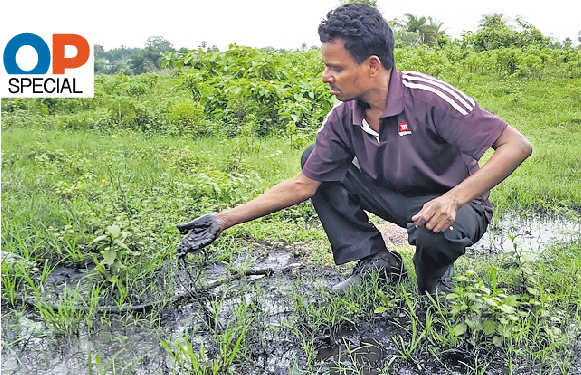Talcher: Notwithstanding the harmful effects of mining in Angul district, a number of coal washery plants have emerged as sources of trouble-making for people residing close to coal processing units of Talcher.
Unregulated discharge of toxic waste from the washery units into the plain areas of villages, drains, ponds and other water bodies is ruining the livelihood of residents. It is ruining not only the health of the villagers but also livelihood of several farmers by destroying the productivity of their farms in the process.
“The coal washery plants have none to regulate them in our area. We have written several letters and complaints to the district administration and also political representatives but to no avail,” said Subodh Kumar Das, a resident of Tentulei.
Das had more than one acre farm land, which he said, was poisoned by black toxic water released from a coal washery plant of Talcher. He said five villages near the plants were dependent on agriculture as the land was fertile, but in recent times villagers residing in the locality have been suffering in silence, thanks to the flow of toxic effluents seeping into their farmlands.
In addition to the loss of agriculture and livelihood, the farmers are fighting various health hazards as the water in the locality has become contaminated and soporofic.
“Six villages near the coal washery units of Talcher are polluting the atmosphere due to smoke emanating from the plants while the chemicals have already turned the water bodies toxic,” said Rita Rani Das, former sarpanch of Tentulei.
A majority of residents in the area are suffering from breathing disorders, skin ailments, cardiac problems, Chronic obstructive pulmonary diseases (COPD) and other pollution-related diseases, she said. The burden of diseases due to rampant pollution seemed to be on the rise in the area, she added.
Several other villagers also echoed similar sentiments. During a visit by this correspondent to the affected villages, many residents showed black toxic chemicals gushing out of the coal washery units into the plain areas and water bodies. The villagers also complained that their children were facing many health hazards due to unregulated escalating industrial pollution.
Many villagers said despite drawing the attention of district administration to their problems, the authorities remained apathetic forcing the villagers to suffer. “Undoubtedly, the operators of the polluting units enjoy political patronage,” they suggested.
Manish Kumar, OP







































